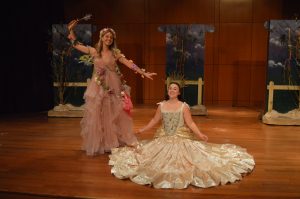The name Pillowman lends itself to a happier, freer spirited story. That is not necessarily the case with Martin McDonagh’s play The Pillowman. While the play is partially about children’s stories, these stories are not the traditional fairy tales. Instead, the show is about a writer, Katurian, in a totalitarian state who is brutally interrogated regarding the gruesome content of his short stories and their similarities to a few of the local child murders happening in his town.
This type of show is a bit of a departure from the usual productions put on in the Fred Stone Theatre, but when John Shoemaker ’12 put in his proposal for his director capstone project, The Pillowman was his first choice. “I know that I’ve wanted to direct this show for three years. I actually read the show my freshman year here and it’s just a great show,” he said. Shoemaker was not alone in his reverence for this play. Matt Striegel ’15 read the play while he was in high school and fell in love with the role of Michael, Katurian’s brother. “It was just this play that was so full of emotion and power and sadness and it just really struck me and when I heard that it was going to be performed here, I was absolutely ecstatic.”
The enthusiasm of the cast, comprised of only five people, was a definite factor in carrying them through the short rehearsal time they were allotted. This show opens the Fred season, meaning they had about four weeks of rehearsal before opening night. “A lot of people have put a lot of love and energy and stress into the show so it’s definitely a living entity,” Alexa Gordon ’13, stage manager of the show, said.
In addition to the challenges the cast and crew faced due to the fast paced rehearsal schedule, they were also up against the difficult plot line and dialogue McDonagh crafted. “Katurian has been for at least five years now a dream role. I would compare it to like a Hamlet or something that as an actor is a destination point, a character I’ve always wanted to tackle,” said Brian Hatch ’12. “This is, to date, the most challenging role I’ve ever played because just like a role like Hamlet, it carries with it such a huge responsibility for something as rudimentary to the number of lines in the show to the amount of time I’m on stage to the range of emotion and experiences that happen throughout the play.”
Shoemaker seconded this sentiment, saying that one of his biggest concerns was if the actors would be able to handle the density of the script. “Honestly, the things I was most worried about were the lines because there are so many of them and they’re so difficult, but the actors have done such a wonderful job with them.” During their first run-through, the actors handled their lines quite well. Shoemaker was right in saying that the lines were difficult. Mc- Donagh is an Irish playwright so all of the dialogue exchanged between the characters was both quick-witted and rather long winded, but the players worked through them with patience and grace.
One of the things that stuck out was the uniqueness of each character. In the end, none of them are pure; they all have skeletons in their closets. They also have gone through experiences that the average person has not dealt with, such as extreme abuse and family deaths. It was difficult for a group of college students to tackle these mature roles, as they are such departures from their own personalities.
However, they each had their own methods of becoming their character. Ryan Bathurst ’12 chose to emulate the bull shark when getting into his character of a seasoned police officer. “I actually did lots of research and watched videos and went to Sea World,” he explained, adding that he has also gained some hands on experience. “I’ve been talking to the Winter Park Police Department … they taught me how to shoot and hold a gun and gave me some interrogation techniques, which is really cool.” Isabella Miyares ’14 decided to focus more inwardly when crafting her character. “The best way for me to get into character for any show is to make sure I portray my character as honestly and truthfully as possible … it’s a very haunting and uncomfortable scene, and from that darkness I had to find the love, beauty and truth in it.”
Regardless of the methods each actor employed to become the character, they all managed to convincingly play troubled adults thrown into this extreme situation. The realism and sincerity that everyone projected helped to tone down the darkness and keep the audience focused. Each person in the cast talked about the dark nature of the show and what they did to overcome it.
Shoemaker focused much of his attention on creating a balance between the dark plots and the honest humanity dominating the show. “I was worried about how dark this play is and you just cannot lose the humanity in it. I feel we’ve found those sweet moments and pulled them forward to contrast them with the darkness.” Hatch added that while it is easy for the audience to be distracted by the heavier issues, there is more to this show than just a dark plot. “I think it’s really an exploration of the length to which we can take our passions … At the end of the day, content aside, it’s the journey of the play that makes it so exciting for the audience because I know without a doubt that that will manifest on stage,” he said. “I think ultimately that’s the hope for our audience is that they’ll leave really questioning themselves and others and I hope that some interesting conversations will be started. To what lengths storytelling can take us and the impact it can have on their lives.”


















Be First to Comment